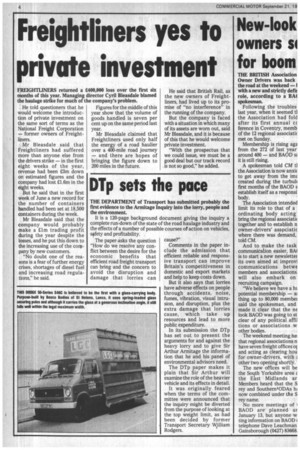DTp sets the pace
Page 6

If you've noticed an error in this article please click here to report it so we can fix it.
THE DEPARTMENT of Transport has submitted probably the first evidence to the Armitage Inquiry into the lorry, people and the environment.
It is a 120-page background document giving the inquiry a complete run-down of the state of the road haulage industry and the effects of a number of possible courses of action on vehicles, sffety and profitability.
The paper. asks the question "How do we resolve any conflict between the desire for the economic benefits that efficient road freight transport can bring and the concern to avoid the disruption and damage that lorries can cause?"
Comments in the paper include the admission that efficient reliable and responsive transport can improve Britain's competitiveness in domestic and export markets and help to keep costs down.
But it also says that lorries have adverse effects on people through accidents, noise, fumes, vibration, visual intrusion, and disruption, plus the extra damage that lorries cause, which take up resources and lead to more public expenditure.
In its submission the DTp has set out to present the arguments for and against the heavy lorry and to give Sir Arthur Armitage the information that he and his panel of environmental advisors need.
The DTp paper makes it plain that Sir Arthur will examine the role of the heavier vehicle and its effects in detail.
It was originally feared when the terms of the committee were announced that the inquiry might be diverted from the purpose of looking at the top weight limit, as had been decided by former Transport Secretary William Rodgers.












































































































































